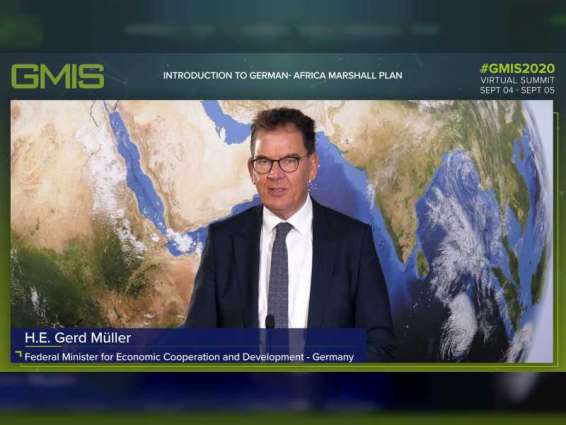HANNOVER, Germany, (Pakistan Point News - 04th Sep, 2020) Germany’s Marshall Plan with Africa marks a new era of cooperation between Europe and Africa that could drive industrial development and deliver huge opportunities for the Africa’s fast-growing youth population, according to speakers at the Global Manufacturing and Industrialisation Summit, #GMIS2020, Virtual Summit, which is taking place from September 4-5.
At a panel session on day one of #GMIS2020, representatives from the public sector discussed the factors that are needed to promote industrialisation on the African continent and how policymakers, development partners and the private sector can address these opportunities through initiatives like the Marshall Plan. The collaborative initiative aims to help bolster entrepreneurship and innovation and create the estimated 20 million new jobs needed in Africa every year.
Gerd Muller, Federal Minister for Economic Cooperation and Development of Germany, said that building EU-African relationships would be a priority under Germany’s sixth month tenure of the Presidency of the Council of the European Union, which began on July 1.
"Africa is home to six of the world’s eleven quickest-growing economies," he said. "It has 89 percent of the world’s copper, cobalt, and rare earth reserves. Africa is the continent of the future. Germany has set up the Development Investment Fund, a support package of one billion Euros for German and European companies that want to get involved in Africa, and for African companies seeking financial resources. Germany is supporting African efforts to strengthen inner-African trade and the diversification of exports by promoting the African continental free trade zone."
João Manuel Gonçalves Lourenço, President of the Republic of Angola, stressed the need for strong government, appropriate oversight, and flexibility in implementing the plan. "The Marshall Plan should focus the goals of the 2063 African Union agenda, whereby the EU and Africa should cooperate on a political, economic, social and cultural level in order to ensure the progress of our continent. On our side, we commit to forwarding the assistance that we'll be receiving to the right areas in order to ensure better monitoring in the implementation of different programs. Weak leadership in projects is a waste of resources, and that is what we need to prevent."
Albert M. Muchanga, Commissioner of Trade and Industry, African Union Commission, emphasised the importance of public-private partnerships to help Africa develop new and sustainable opportunities for young people. He said: "For us to ensure that we dynamise the process of industrialisation and also try to leverage the opportunities offered by the fourth industrial revolution, we need to develop a partnership among the governments, academia, and the private sector. We need governments to provide the policy framework and to provide public resources. And we need the private sector and academia to embark on vigorous training programmes as well as rigorous research and development programmes."
Ebrahim Patel, Minister of Trade and Industry of South Africa, spoke of the urgent need for Africa to start living up to its true potential by increasing its GDP and providing employment for a burgeoning youth population. Developing a strong manufacturing base, he said, was one way to shift from being a provider of raw materials and unprocessed agricultural products to becoming an importer of consumer goods.
"African countries are learning the hard lesson that we cannot remain simply exporters of raw materials and importers of finished goods like medical supplies and processed food products," he said. "We must confront uncomfortable facts and deal with Africa’s position in the global economy. Africa has 17 percent of the world’s population, yet only 3 percent of the world’s GDP, 2 percent of the global manufacturing output and 1 percent of global steel production."




